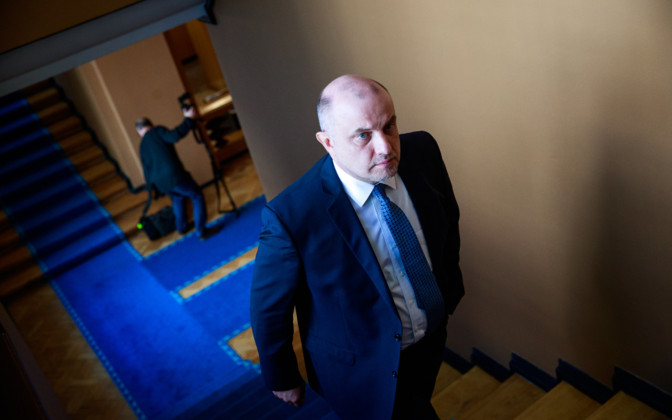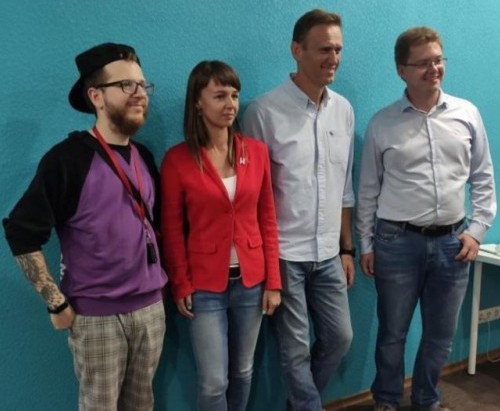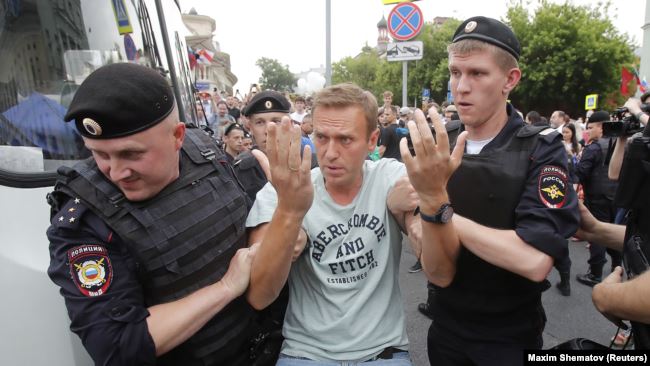Defense minister: Lukashenko looking to give Russia pretext to intervene - News.err.ee.com 26 Aug 2020

Minister of Defence Jüri Luik (Isamaa). Source: Siim Lõvi/ERR
Defense minister Jüri Luik (Isamaa) has condemned the actions of Belrusian president, Alexander Lukashenko, saying the newly re-elected leader has been creating a straw man enemy which might give neighboring Russia a pretext to intervene, as well as continuing repression against the Belarusian people in the aftermath of the election over two weeks ago.
‘By emphasizing the threat of NATO, Lukashenko is trying to shift the blame for the domestic crisis on a phantom enemy which doesn’t exist and to give Russia an excuse to intervene,” Luik said Wednesday, according to a ministry press release.
The defense minister was in Berlin, meeting with his German opposite number Annegret Kramp-Karrenbauer as part of a wider EU defense ministers’ get together, the first of its kind since the coronavirus pandemic began in spring.
“At the same time, Lukashenko has embarked on a series of new domestic repressions, which are now directed primarily against protest movement leaders,” Luik added.
Both ministers said of key importance is how to support the democratic will of the Belarusian people. Democratic values and their fostering in Belarus was at stake, not whether that country could one day become an EU member, Kramp-Karrenbauer added.
The pair also discussed the recent poisoning of Russian opposition leader Alexei Navalny, which Luik called another sad example of Russia’s disregard for both human life and democratic freedoms.
Navalny, 44, is in a German hospital, having been taken there last Saturday, where he remains in an artificially-induced coma.
That Navalny was poisoned is beyond question, the German defense minister added, though it was currently not clear what toxin had been used or what Navalny’s long-term situation might be.
The ministers also discussed broader EU, NATO and bilateral security issues, and Luik thanked Germany for its contribution to Baltic Air policing duties ahead of its air force’s arrival at Ämari Air Base, where it will replace the French Air Force planes currently based there as part of the Baltic air policing rotational system.
A total of 13 EU defense minister were in Berlin Wednesday; other topics for discussion included the situation in the West African country of Mali – whose French-led peace-keeping efforts Estonia’s defense forces contribute to – and in the Mediterranean.
Before He Fell Ill, Navalny’s Every Move Was Tracked. What About The Poisoning? - RadioFreeEurope, 26 Aug 2020:

Russian opposition leader Aleksei Navalny (2nd right) poses for a picture with supporters in Tomsk on August 19.
MOSCOW—When Aleksei Navalny arrived in Novosibirsk earlier this month to meet with local opposition activists, security services in the Siberian city were already tracking his moves.
After he and three colleagues left on August 18 to drive 250 kilometers south to Tomsk, a group of plainclothes officers trailed him. In Tomsk itself, every detail of his two-day visit—including the location of his rented apartment and the names of people he met—was recorded.
“Law enforcement noted no suspicious contacts that could be linked to a poisoning,” read an article by the Moskovsky komsomolets tabloid that detailed the depth of this surveillance and cited anonymous officials in Russia’s security services.
The article was published on August 21, the day after Navalny collapsed on board a plane flying to Moscow and was hospitalized after an emergency landing in Omsk. Navalny now lies comatose in a Berlin hospital, where German doctors say he appears to have been poisoned with a potentially dangerous chemical. The Kremlin has rebuffed Western calls for an immediate investigation.
The fact that details of Navalny’s movements were recorded and leaked to a pro-government newspaper wasn’t wholly surprising. But the leaks conspicuously omitted the fact that despite the blanket surveillance, security agencies, implausibly, failed to detect the moment when the toxin may have been ingested.
For Dmitry Belousov, who formerly worked for a state-controlled TV channel, access by Moskovsky komsomolets and other pro-Kremlin media to sensitive information about opposition activists is part of a broader system of leaks and favors. That system underpins the government’s sprawling monitoring apparatus, which targets all opposition activists but first and foremost Navalny, the most prominent critic of state corruption.

Aleksei Navalny is detained during an opposition demonstration in June 2019.
It’s a system reliant not only on covert and open surveillance, but also the collaboration of freelancers who trail Navalny’s every move to produce so-called “kompromat,” or compromising material that can be shared with friendly media and aired to the population at large, driving the narrative that the opposition itself is venal.
According to Belousov, who previously worked as a scriptwriter for REN-TV, it’s an operation financed directly or indirectly by the administration of President Vladimir Putin. It’s an operation, he said, that often owes its success to the freelance bit-players working on the ground and feeding footage to the press and TV outlets that traffic in pro-government propaganda.
“Seminars, meetings, campaign tours: they work at every opposition event, and they do it for money,” Belousov told RFE/RL in a phone interview from the Netherlands, where he is seeking asylum. “And their footage then makes it onto REN-TV and other channels. They’re [a form of] outsourcing for the big channels.”
Until 2017, Belousov worked on an investigative program that regularly targeted opposition activists, including by using compromising video footage obtained from the Federal Security Service (FSB).
Belousov, who first shared his story with Proekt, a Russian investigative outlet, said the FSB gets paid orders to gather such information on opposition activists in the major cities and far-flung regions.
“The FSB fulfills requests of handlers in the presidential administration,” he said. “It’s not that they want to do it themselves. They’re like a store that anyone with access can use to get the information they need. But obviously the president’s administration is prioritized.”
Navalny’s Probes
For almost a decade, Navalny has been the Kremlin’s most vocal critic. He’s amassed a vast online following through exposés of top-level corruption among the Russian elite and his successful coordination of large opposition protests throughout the country.
His corruption probes have targeted not only government officials but also businessmen with close alleged ties to President Vladimir Putin.
That includes Yevgeny Prigozhin, the catering magnate whom Western intelligence services accuse of running the “troll farm” that sowed disinformation ahead of the 2016 U.S. election. Prigozhin also runs the Vagner private military company, which has sent mercenaries to Ukraine, Syria, Libya, and elsewhere.
The Kremlin has rejected Western calls for an immediate investigation into Navalny’s incapacitation, and tried to refute the German findings, saying that until doctors could pinpoint the specific substance used against him, it’s wrong to assert that he was poisoned.
“We are categorically against anyone attempting to do any labeling under the current circumstances, we’re against calling this condition—which has not been definitively confirmed as poisoning—a case of poisoning,” Kremlin spokesman Dmitry Peskov said on August 26.
He also claimed German doctors were “rushing” to use the word “poisoning.”
The Russian doctors who initially treated Navalny issued contradictory statements about his health and the presence of toxins in his body.
According to Navalny’s spokeswoman, his wife, and his private doctor, they actively opposed his transfer to Germany under pressure from police officers and unidentified men who kept watch over the Omsk ward during Navalny’s treatment there.
The Kremlin has denied surveilling Navalny or working with pro-government channels.
But Mikhail Rubin, the author of the Proekt investigation, said the notion that the Kremlin would be clueless as to how he fell ill did not stand up to scrutiny.
“With that amount of surveillance, with such a large number of resources focused on Navalny, they should at least have some idea of what happened to him,” Rubin told the Meduza news site. “We can state that with certainty.”
